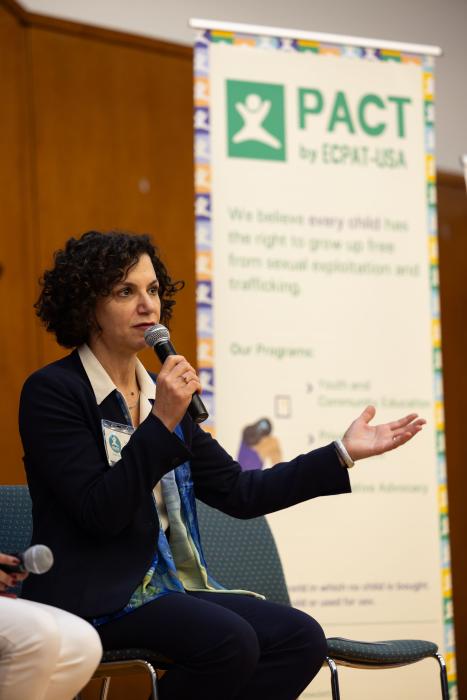PACT is always looking for new partners in the fight to eliminate the sexual exploitation and trafficking of children. It's in their name -- Partners Against Child Trafficking -- and in their daily work. The organization took this search in a fresh direction when they teamed with the United Nations to host a two-day conference in New York City that brought together voices from around the world to discuss socially responsible practices in travel and tourism.

PACT CEO Lori Cohen said the conference was linked to reports presented to the UN General Assembly, one by Mama Fatima Singhateh, UN Special Rapporteur on the sale and exploitation of children; the other by Dr. Najat Maalla M'jid, Special Representative of the Secretary-General on Violence Against Children. Singhateh is a former Gambian justice; Dr. M'jid is a pediatrician who founded a program to help children living and working on the streets of Morocco.
Both reports highlight a worrisome trend: as travel and tourism increase post-pandemic, so do child trafficking opportunities, especially in the area of voluntourism -- currently a $2 billion industry. "Imagine your child is a third grader here in the U.S.," said Cohen, "and different groups come into school to watch, play with the kids, day after day. On a benign level it's disruptive; in terms of trafficking, it's an opportunity."
INTERNATIONAL DISCUSSION
At the October 10 panel, representatives from the Netherlands, Bolivia, the Philippines, Cambodia, Australia, the U.S. and Germany heard from Singhateh and discussed how to translate the report's recommendations into concrete actions. In Germany, orphanage tours have been outlawed. Companies like Dutch organization Travel4Change have stopped placing volunteers in orphanages.
The panel was held at an Episcopal church in Manhattan in recognition of U.S. churches' involvement in voluntourism. "This conversation is not to be critical," said Cohen, "but to be mindful of the impact." PACT representatives spoke about resources the agency can provide to faith groups before travel, procedures to ensure the trips do not open windows for trafficking.
The October 12 panel included speakers from ten countries and focused on Dr. M'jid's UN report on child protection in travel and tourism. Children from Ecuador and Costa Rica spoke about what they need to thrive and be safe in relation to tourism in their countries. PACT includes survivors in all trafficking prevention work, said Cohen. "If we're going to create policies for children, we need their perspectives."
A discussion on promising practices in the transportation industry included work being done by Bolivian bus terminals -- vendors keep an eye out for homeless children, connecting them to helping agencies before traffickers can swoop in -- and efforts by Mexican airline Volaris.
Ximena Fuentes of Volaris shared company policies, training, and procedures that are preventing traffickers from using the airline. Volaris is a member of The Code, a joint venture between the tourism private sector and PACT to provide awareness, tools, and support to prevent child sexual exploitation.
The conference ended with a conversation on how the world's financial sector can identify and prevent trafficking by shutting down money laundering and detecting transactions relating to online sexual exploitation.
NEXT STEPS
"This is the first time we've hosted a conference like this," said Cohen. "To have two UN representatives was ambitious. Now -- where do we go from here?"
Next steps include spreading the word about trainings PACT can provide to volunteer groups, churches, public school systems, and celebrating private sector partners who have committed to training employees to identify and report trafficking.
Both UN reports presented at the PACT conference are a global call to action -- to translate recommendations into concrete actions with the goal of sustaining travel and tourism while protecting children. Cohen is energized by the conversation and the knowledge that partnership is growing. "This is meaningful work that's a win-win for us all."
Learn more at The Code.